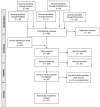The Impact of COVID-19 on Healthcare Worker Wellness: A Scoping Review
- PMID: 32970555
- PMCID: PMC7514392
- DOI: 10.5811/westjem.2020.7.48684
The Impact of COVID-19 on Healthcare Worker Wellness: A Scoping Review
Abstract
At the heart of the unparalleled crisis of COVID-19, healthcare workers (HCWs) face several challenges treating patients with COVID-19: reducing the spread of infection; developing suitable short-term strategies; and formulating long-term plans. The psychological burden and overall wellness of HCWs has received heightened awareness in news and research publications. The purpose of this study was to provide a review on current publications measuring the effects of COVID-19 on wellness of healthcare providers to inform interventional strategies. Between April 6-May 17, 2020, we conducted systematic searches using combinations of these keywords and synonyms in conjunction with the controlled vocabulary of the database: "physician," "wellness, "wellbeing," "stress," "burnout," "COVID-19," and "SARS-CoV-2." We excluded articles without original data, research studies regarding the wellness of non-healthcare occupations or the general public exclusively, other outbreaks, or wellness as an epidemic. A total of 37 studies were included in this review. The review of literature revealed consistent reports of stress, anxiety, and depressive symptoms in HCWs as a result of COVID-19. We describe published data on HCW distress and burnout but urge future research on strategies to enhance HCW well-being.

